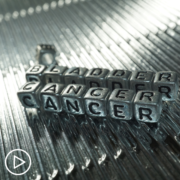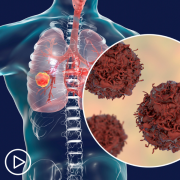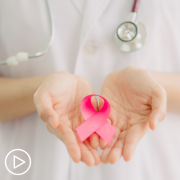Understanding Common Bladder Cancer Treatment Side Effects
Understanding Common Bladder Cancer Treatment Side Effects from Patient Empowerment Network on Vimeo.
Dr. Shilpa Gupta of the Cleveland Clinic reviews the most common side effects of bladder cancer therapies.
Dr. Shilpa Gupta is the Director of the Genitourinary Medical Oncology at Taussig Cancer Institute and Co-Leader of the Genitourinary Oncology Program at Cleveland Clinic. Dr. Gupta’s research interests are novel drug development and understanding biomarkers of response and resistance to therapies in bladder cancer. Learn more about Dr. Gupta, here.
See More From The Pro-Active Bladder Cancer Patient Toolkit
Related Programs:

The Importance of Patient Self-Advocacy in Bladder Cancer Treatment |

|

|
Transcript:
Katherine:
I imagine side effects vary among patients. What side effects should someone undergoing treatment be aware of?
Dr. Gupta:
Yeah, and that also depends on what kind of treatment they’re getting, Katherine. So, if somebody’s getting chemotherapy, some of the usual chemotherapy related side effects.
Again, it depends on what chemotherapy they are getting, but usually it’s nausea, vomiting, peripheral neuropathy, hair loss, low count, so we try to prevent their counts from going down to prevent infection. If they’re undergoing a local therapy like BCG, they may get irritation in the bladder, something called urinary tract infections can happen, or just an inflammatory state.
Immunotherapy is not as hard as chemotherapy, any day it’s easier but it can cause some rare and infrequent side effects because the immune system can turn against other organs which can sometimes be life threatening or fatal. That could be inflammation of the lung, of the colon, of the different organs in the brain, of the thyroid gland, of muscles, of heart. It can be pretty much anything. We educate the patients accordingly for that.
And, as far as the newer antibody drug conjugates are concerned, they can cause neuropathy or low counts, hair loss. So, every treatment depending on what treatment we’re choosing has a different treatment side – related toxicity profile and we go about reducing or modifying doses as we go along treating the patient.










